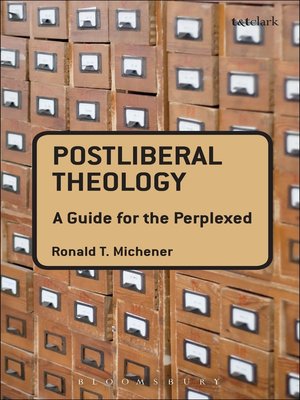Postliberal Theology
ebook ∣ A Guide for the Perplexed · Guides for the Perplexed
By Ronald T. Michener

Sign up to save your library
With an OverDrive account, you can save your favorite libraries for at-a-glance information about availability. Find out more about OverDrive accounts.
Find this title in Libby, the library reading app by OverDrive.



Search for a digital library with this title
Title found at these libraries:
| Library Name | Distance |
|---|---|
| Loading... |
Postliberal theology is a movement in contemporary theology that rejects both the Enlightenment appeal to a 'universal rationality' and the liberal assumption of an immediate religious experience common to all humanity. The movement initially began in the 1980's with its association to Yale Divinity School. Theologians such as Hans Frei, Paul Holmer, David Kelsey, and George Lindbeck were influential and were significantly influenced by theologians such as Karl Barth, Clifford Geertz, and Ludwig Wittgenstein. Postliberalism uses a narrative approach to theology, such as developed by Hans Frei, and argues that all thought and experience is historically and socially mediated.
Michener provide the reader with an accessible introductory overview of the origins, current thought, potential problems, and future possibilities of postliberal theology. The basic philosphical and theological background are be briefly discussed, along with the seminal and predominant theologians identified with the movement. Michener shows how postliberalism emerges from the context of the postmodern critique of Enlightenment rationalism and empiricism. Postliberal theology is extremely critical of classical liberal theology, rather than an advancement of its agenda.
Michener provide the reader with an accessible introductory overview of the origins, current thought, potential problems, and future possibilities of postliberal theology. The basic philosphical and theological background are be briefly discussed, along with the seminal and predominant theologians identified with the movement. Michener shows how postliberalism emerges from the context of the postmodern critique of Enlightenment rationalism and empiricism. Postliberal theology is extremely critical of classical liberal theology, rather than an advancement of its agenda.







